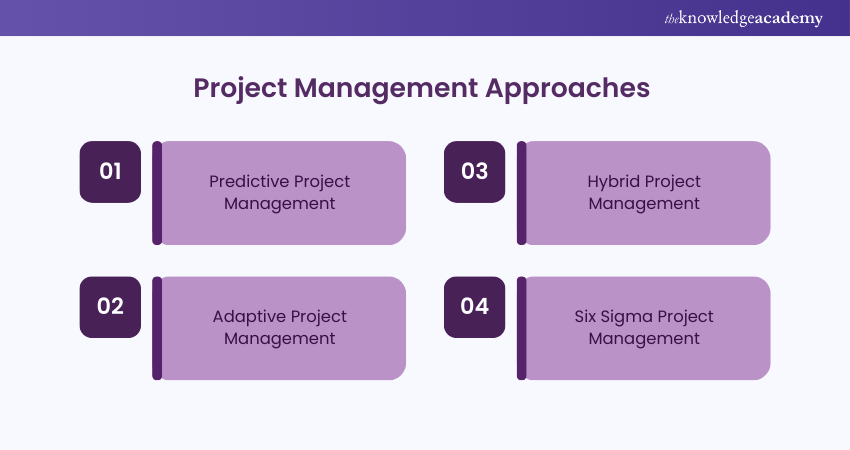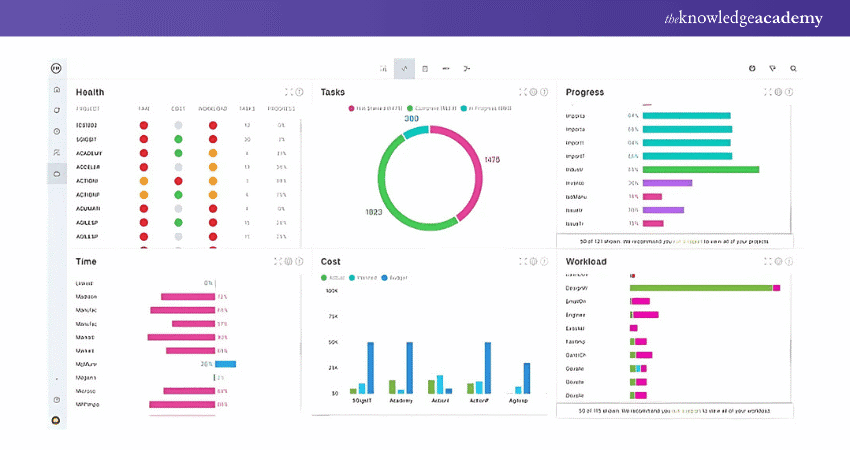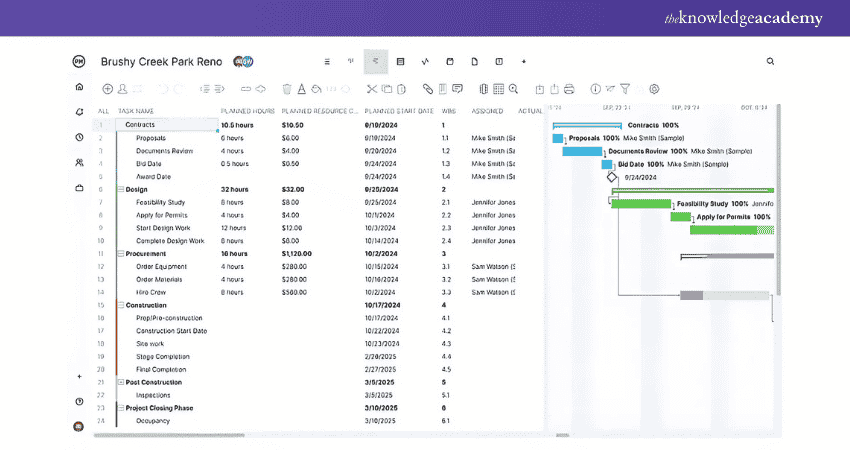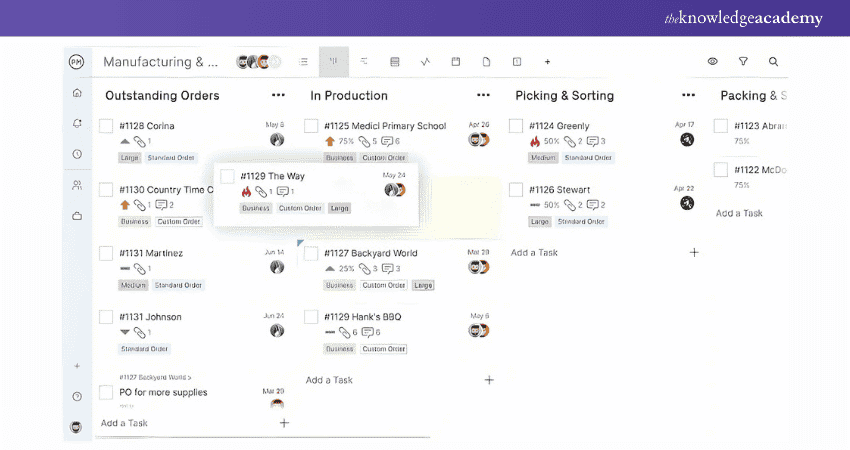We may not have the course you’re looking for. If you enquire or give us a call on +44 1344 203999 and speak to our training experts, we may still be able to help with your training requirements.
We ensure quality, budget-alignment, and timely delivery by our expert instructors.

Project Management involves managing, organising, and Planning resources to achieve specific goals within a set timeframe. It requires handling tasks in an organised way, ensuring that objectives are met efficiently. From managing team size and roles to implementing Effective Communication strategies, Project Management adapts to the needs of each project.
Are you ready to lead teams and drive projects to success, meeting business goals on time? A Career in Project Management might be the perfect fit for you. If you're new to this exciting field, don't worry. We're here to guide you step by step through the basics of Project Management. You'll learn What is Project Management and why it can be a great and rewarding career choice. By staying updated with project management trends, you’ll be able to apply the most effective and innovative approaches to your projects.
Curious to learn more? Read this blog to explore how Project Management can enhance your career and help you lead projects successfully.
Table of Contents
1) What is Project Management?
2) What are the stages of Project Management?
3) Project Management Approaches
4) Types of Project Management
5) What Tools Are Used in Project Management?
6) Conclusion
What is Project Management?
Project Management involves applying processes, methods, skills, knowledge, and experience to achieve specific project objectives within set parameters. It has final deliverables with a finite timescale and budget.
What sets Project Management apart from general management is its focus on a final deliverable and a defined timespan, unlike ongoing management. Therefore, to Project Manager one needs a variety of skills, including technical skills, people management, and business awareness.
What is a Project?
A project is a unique and temporary effort to achieve planned goals, which can be defined in terms of outputs, outcomes, or benefits. Success is often evaluated through a Project Audit, ensuring that the project meets its objectives within the agreed timescale and budget. Every project relies on three main elements:
a) Time: Project Scheduling Techniques are used to develop and present when work will be performed.
b) Cost: How necessary funds are acquired and finances managed.
c) Quality:How is the fitness for the purpose of deliverables and management processes ensured?
Why do we use Project Management?
We use Project Management to create an end product that brings positive change to an organisation. It involves project initiating, planning, and controlling various tasks to achieve this goal. Projects that need formal management typically:
a) Produce something new or modified, whether tangible or intangible.
b) Have a clear start and end date.
c) Are complex in terms of tasks or teams involved.
d) Require managing changes.
e) Require project risk management
Investing in effective Project Management offers several benefits:
a) Increases the chances of achieving the desired outcome.
b) Ensures efficient and optimal use of resources.
c) Meets the diverse needs of the project’s stakeholders.
Example of Project Management
A manager leads a team to build new software apps. They start by specifying the project’s size. Then, they classify team jobs and list developers, engineers, technical writers, and quality assurance specialists. The manager prepares a schedule and assigns deadlines to tasks.
Project Managers often use diagrams like Gantt or PERT charts to show progress. These tools help determine which tasks each office will complete. They also define a budget that is more than enough to handle unforeseen events.
The manager ensures the team has the resources to build, test, and deploy the software. They unify team members from different backgrounds and explain the project’s overall purpose, which should be effectively conveyed in a strong Project Manager CV. While managers may be technically skilled, their main role is to turn high-level visions into real, budgeted, and time-bound results.
Unlock the power of productivity with Using Google Calendar as Project Management Tool. Start organizing your projects today for better results!
What are the stages of Project Management?
In Project Management, phases help improve project quality by reducing risks. Breaking the process into tasks based on time and complexity ensures timely delivery and higher quality. There are mainly five phases in Project Management
Initiation:
The project begins with defining its vision, objectives, and feasibility.
Planning:
A project plan is created, tasks are sequenced, resources are allocated, and risks are identified.
Execution:
The project plan is implemented, tasks are completed, and quality standards are maintained.
Monitoring:
Project performance is tracked, deviations are corrected, and changes are managed.
Closing:
Final deliverables are handed over, administrative tasks are completed, and lessons are reviewed.
Learn risk identification and mitigation plans with our Project Management Certification - Get certified and lead with confidence!
Project Management Approaches
Project Management Methodologies offer structured approaches to handling and completing project activities efficiently. These methods help organise work, reduce complexities, save costs, and minimise risks. Below are some of the most common Project Management approaches:

Predictive Project Management
Predictive Project Management is also known as the Waterfall methodology. This approach is a linear and sequential process where each phase must be completed before moving on to the next. It's ideal for projects with clearly defined goals and stable requirements. Examples of this approach include the Critical Path Method (CPM) and PRINCE2.
Adaptive Project Management
This is a flexible, iterative process that breaks projects into short "sprints,". It incorporates frequent feedback and allows for changes throughout the project. This approach is suited for projects that may evolve, like product development. Examples include Scrum, Kanban, and Extreme Programming (XP).
Hybrid Project Management
The hybrid approach combines predictive and adaptive methodologies, allowing teams to leverage the best aspects of both based on project needs. It can be customized to meet specific organizational requirements while ensuring alignment through a Requirements Traceability Matrix. A prime example is Scrumban, which integrates elements of Scrum and Kanban.
Six Sigma Project Management
Six Sigma is focused on improving quality by reducing errors and defects. It uses statistical tools to identify and eliminate causes of variation. Often used in large organisations, it aims to improve processes and eliminate waste, employing methodologies like DMAIC (Define, Measure, Analyse, Improve, Control).
Enhance your Project Management skills with our Waterfall Project Management Certification - Start your journey to success now!
Types of Project Management
Over the years, numerous project management methodologies have been created to meet the diverse needs of various industries. Certain methodologies are more effective for projects of specific sizes and complexity levels. Here is a list of the key project management methodologies you must know about.
Waterfall Project Management
This linear, sequential approach requires each task to be completed before the next starts, focusing heavily on task sequences and timelines. Teams often grow as smaller tasks are completed and larger ones begin.
Agile Project Management
An iterative process used initially in software development, Agile focuses on continuous monitoring and improvement. It completes project phases in parallel, allowing for quick error identification and correction without restarting the entire process.
Lean Project Management
Lean Methodology aims to avoid waste of time and resources, focusing on creating more value for customers with fewer resources. Only resources directly contributing to project completion are used, similar to lean enterprise principles.
Kanban Project Management
Kanban is a widely used project management approach that uses visual boards and cards to manage work. It optimises workflows, particularly in lean and agile environments, and is often used by agile and scrum teams.
Scrum Project Management
Scrum Methodology is a popular agile framework, which is used in product and software development. It facilitates collaboration, flexibility, and iterative progress in projects.
Master SAP Projects! Understand What is SAP Project Manager and How to Succeed.
What Tools Are Used in Project Management?
There is a variety of project management tools available both online and on mobile to help manage projects effectively. Here are some essential tools for project managers:
Project Dashboard
A project dashboard is a tool for tracking costs, tasks, and progress. It's invaluable during project execution as it helps managers quickly assess if projects are on track.

Gantt Charts
A Gantt chart visually represents a project timeline, displaying all tasks in a single graph. It's used for planning, scheduling, task management, and Project Resource Management, particularly in waterfall projects. Gantt charts help schedule tasks, manage dependencies, and avoid bottlenecks by linking tasks and marking milestones with diamond symbols.

Kanban Boards
Kanban boards are task management tools that allow project managers and team members to visualise tasks. Commonly used by agile and scrum teams, they facilitate iterative sprints, are easy to use, and enhance team collaboration.

Optimize Your Project Management Strategy – Download the Earned Value Management PDF today!
Conclusion
Project Management is the process of applying specific skills, knowledge, and tools to effectively plan, execute, and oversee tasks to meet project goals. It ensures projects are delivered on time, within budget, and to the desired quality. For those starting out, Entry Level Project Management Jobs provide a great opportunity to gain practical experience and develop core skills. Understanding Crashing in Project Management and its role is essential for efficiently managing resources and achieving successful outcomes in any industry.
Explore our courses on Project Management Courses - Sign up today to take your career forward.
Frequently Asked Questions
What Practical Skills do I Need for a Successful Project Management Career?

Project Management is the process of planning, organising, and overseeing tasks to achieve specific goals within a set timeframe and budget. It involves defining the project's scope, setting objectives, and managing resources to ensure successful completion. Project Management aims to deliver a final product or service that meets the desired criteria. It ensures that the project stays on track, within budget, and meets quality standards. The Project Manager coordinates the efforts of the team, addresses challenges, and makes necessary adjustments to keep the project moving forward.
What are the 5 Basics of Project Management?

The 5 basics of Project Management are:
a) Project Initiation: Define the project, its purpose, and objectives.
b) Project Planning: Create a detailed plan with tasks, timelines, resources, and budgets.
c) Project Execution: Implement the plan, manage the team, and execute tasks.
d) Project Monitoring: Track progress, identify issues, and adjust as needed.
e) Project Closure: Complete the project, deliver the final product, and evaluate success.
How Does Technology Affect the Approach to Project Management?

Technology revolutionises Project Management with real-time communication, task tracking, and analytics. Automation reduces a lot of important Project Management Approaches.
What are the Other Resources and Offers Provided by The Knowledge Academy?

The Knowledge Academy takes global learning to new heights, offering over 3,000 online courses across 490+ locations in 190+ countries. This expansive reach ensures accessibility and convenience for learners worldwide.
Alongside our diverse Online Course Catalogue, encompassing 19 major categories, we go the extra mile by providing a plethora of free educational Online Resources like News updates, Blogs, videos, webinars, and interview questions. Tailoring learning experiences further, professionals can maximise value with customisable Course Bundles of TKA.
What is The Knowledge Pass, and How Does it Work?

The Knowledge Academy’s Knowledge Pass, a prepaid voucher, adds another layer of flexibility, allowing course bookings over a 12-month period. Join us on a journey where education knows no bounds.
What are the Related Courses and Blogs Provided by The Knowledge Academy?

The Knowledge Academy offers various Project Management Courses, including Introduction to Project Management Course, Project Management Office (PMO) Fundamentals Course and Certified Digital Services Project Manager Course. These courses cater to different skill levels, providing comprehensive insights into Top 13 Project Management Trends.
Our Project Management Blogs covers a range of topics offering valuable resources, best practices, and industry insights. Whether you are a beginner or looking to advance your Business Improvement skills, The Knowledge Academy's diverse courses and informative blogs have you covered.
Upcoming Project Management Resources Batches & Dates
Date
 Project management Certification
Project management Certification
Fri 23rd May 2025
Fri 18th Jul 2025
Fri 12th Sep 2025
Fri 12th Dec 2025






 Top Rated Course
Top Rated Course



 If you wish to make any changes to your course, please
If you wish to make any changes to your course, please


